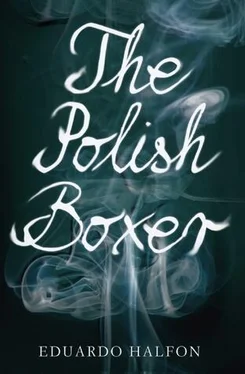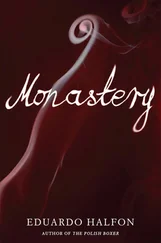Eduardo Halfon - The Polish Boxer
Здесь есть возможность читать онлайн «Eduardo Halfon - The Polish Boxer» весь текст электронной книги совершенно бесплатно (целиком полную версию без сокращений). В некоторых случаях можно слушать аудио, скачать через торрент в формате fb2 и присутствует краткое содержание. Год выпуска: 2012, Издательство: Bellevue Literary Press, Жанр: Современная проза, на английском языке. Описание произведения, (предисловие) а так же отзывы посетителей доступны на портале библиотеки ЛибКат.
- Название:The Polish Boxer
- Автор:
- Издательство:Bellevue Literary Press
- Жанр:
- Год:2012
- ISBN:нет данных
- Рейтинг книги:4 / 5. Голосов: 1
-
Избранное:Добавить в избранное
- Отзывы:
-
Ваша оценка:
- 80
- 1
- 2
- 3
- 4
- 5
The Polish Boxer: краткое содержание, описание и аннотация
Предлагаем к чтению аннотацию, описание, краткое содержание или предисловие (зависит от того, что написал сам автор книги «The Polish Boxer»). Если вы не нашли необходимую информацию о книге — напишите в комментариях, мы постараемся отыскать её.
marks the debut of a major new Latin American voice in English.
The Polish Boxer — читать онлайн бесплатно полную книгу (весь текст) целиком
Ниже представлен текст книги, разбитый по страницам. Система сохранения места последней прочитанной страницы, позволяет с удобством читать онлайн бесплатно книгу «The Polish Boxer», без необходимости каждый раз заново искать на чём Вы остановились. Поставьте закладку, и сможете в любой момент перейти на страницу, на которой закончили чтение.
Интервал:
Закладка:
When I reached Tecpán it was almost noon. I parked the car and walked into a place called Tienda Lucky. A plump woman was patting tortillas onto an enormous comal, but they were purple, or maybe deep blue. She must have noticed the look on my face because immediately she whispered that they were called black tortillas. Ah, I said, and took a seat.
A ranchera song could be heard in the distance. On the walls were three framed photos: what looked to be a Swiss cottage, a couple of white horses on a lawn, and a blond cop standing beside his shiny cruiser, complete with German shepherd at his side and a huge caption that read BEVERLY HILLS POLICE DEPARTMENT.
Out of nowhere, there appeared a girl who looked about ten, had beautiful features, and was decked out from head to toe in traditional clothing. She said hello. I ordered a beer and was about to light a cigarette when she tsked and pointed to a sign that said no smoking. But I can ask my aunt, she said in heavily accented Spanish, as though each word took a huge effort to pronounce. No, no, that’s fine, and I put my cigarettes away.
At another table, a man in a hat and boots was drinking a bottle of India Quiché cola. He wore a piece of black cloth, a sort of apron-looking thing, hanging from his belt. He waved at me, but without looking.
The girl returned with my beer. I asked her name. Norma Tol, she said, smiling. That’s pretty. How do you spell Tol? Tee, oh, el, she responded, drawing each letter in the air with her index finger. Tell me, Norma, is your aunt here? Yes, she said, and she didn’t say any more. Could you call her over for me? I asked, and she ran to a door leading to the back. To the kitchen, I supposed. A bus overflowing with people crossed the road, leaving a thick trail of dust and noise in its wake. Good morning, said a very short woman dressed in black, and I saw that Norma was directly behind her, barricaded, protected. I said pleased to meet you, and apologized for troubling her. It’s no trouble, she said in an accent even thicker than her niece’s. Her hands were covered in some type of red sauce and she wiped them repeatedly on her skirt, rubbing hard. You must be Doña Lucky, I guess. That’s right, muchacho, how can I help you? I explained that I was from the capital and that I was in Tecpán looking for a student. I’m his professor, well, I was his professor. Ah, she said, frowning, I see. And your student lives here? Yes, in Tecpán. And what’s his name? His last name is Kalel. Juan Kalel is his name. She thought for a moment and then told me that there were a lot of Kalels in Tecpán, that it was a very common last name. I know his father is in charge of an orchard in Pamanzana, I continued, but she shook her head. And his mother works in a textile factory. Doña Lucky turned to the man in the hat and boots and asked him something in Cakchikel. I was going to say that Juan had a big scar on his right cheek, but I decided not to. Go to Pamanzana, the man told me. Yes, you go there, muchacho, Doña Lucky echoed. It is close and I think they will know him there. And then with some difficulty the two of them gave me directions.
I put a few bills on the table and stood. You don’t want something to eat, muchacho? Doña Lucky asked, and I said thank you, no. Some pork rinds or a little estofado, maybe? No, thank you. You know estofado is the local dish in Tecpán? I said no, I didn’t know. How do you prepare it, señora? Four different meats, she replied, pig, chicken, cow, and goat. You cook it in a big pot until the meat falls apart, with some thyme and laurel and orange juice and vinegar and a splash of beer and a splash of Pepsi. She smiled, but I couldn’t tell if she was joking or not. Excuse me, I said to the man, who was still sitting there, what’s the name of that cloth you have hanging from your belt? This? he asked, holding it up. It’s a knee cloth, he said. Very traditional, he said. The kids don’t want to wear them anymore, he said. I asked him what the Cakchikel name was, and cradling it like a wounded dove, he replied xerka. Excuse me? Xerka, he repeated, barely parting his lips. With an X? I asked, and he shrugged and said that he wouldn’t know.
Technically, Pamanzana is a hamlet, though that’s a pretty benevolent way to put it. Half a dozen adobe and rusted sheet-metal shacks lined the road, looking like they were about to collapse. I parked my car and walked to the tiny shop with a Rubios Mentolados cigarette sign over its door. Outside, a dog napped contentedly in the only spot of shade. Inside, a girl sat behind a metal grille, looking incarcerated, and she stood when she saw me. Good afternoon, I said. She just smiled uneasily. There was a strong smell of dried sardines, and instinctively I took a step back. I’m looking for the Kalel family, I said, for a young man named Juan Kalel, but the girl just smiled, more fearfully than pityingly. Do you know Juan Kalel? Crossing her arms, she murmured something unintelligible. His father tends an orchard here in Pamanzana. No response. I stood silently for a few seconds. I thought about all the bars that stood between us, about all those barriers, and I felt helpless. I bought a pack of cigarettes and, after lighting one, went back out to the street.
I walked toward the shacks, but there was no one in sight. The dog had awakened and was barking at something. A snake, maybe. Or a rat. I leaned against the car and for some reason thought of Annie Castillo, of her eyes, which had once struck me as molasses-colored, of her pallor, of her loneliness, and for a moment I felt a mixture of love and disdain and apprehension. I thought of all the students like Annie Castillo, who lived so close to hamlets like Pamanzana, but who also lived so blindly distant from hamlets like Pamanzana. And staring at the shacks and the dust, I thought about all the stories that, shut away in a more perfect world, we read and analyzed and discussed, as if reading them and analyzing them and discussing them actually mattered. And then I didn’t want to think anymore.
I lit another cigarette. I was about to start reading some of Juan Kalel’s poems, when I heard footsteps behind me. It was a woman dressed in black, carrying a big bag of fruit or vegetables. She wore a fine white mantilla on her head. She stopped just beside me, solemn and sweltering. You must be Señor Halfon, she said with no expression whatsoever, pronouncing my name the same way Juan Kalel did. I smiled, perplexed. She still looked somber. Her face was cheerless and weather-beaten, like an old sailor’s. Juan has a book of yours, she said, and I recognized you from the photo. Are you his mother? She nodded just like her son. I told her I was very glad to meet her, that I’d come from the capital to speak to Juan a little but that I didn’t know where to find him. Without looking at me, she said I was lucky, that she had only come to Pamanzana to get some cauliflower from the orchard her husband tended and that she was on her way back to Tecpán now. I offered her a ride and she accepted without a word.
Sitting uncomfortably in my car, she asked me if I was there to convince Juan to go back to school. Not at all, I said, I just want to speak to him. I decided not to mention his poetry. She was quiet for some time, staring out the window, holding her bag of cauliflower. I can assure you he won’t be going back, she said suddenly. I was about to repeat that this wasn’t why I’d come, but instead I said nothing. We need our Juan close by at the moment, she said, faltering. I didn’t turn to look, but from the tone of her voice I could have sworn she was crying.
The Kalel house was on the outskirts of Tecpán, on the road to the Mayan ruins of Iximché. Once, as a kid, I visited Iximché with the family of a school friend, and the only memory I have is of eating green mango with lime and ground pumpkin seeds, and then vomiting it all up by the stones of some temple or altar. I remember my friend’s mother fanning me with something as she gave me bitter sips of tonic water.
Читать дальшеИнтервал:
Закладка:
Похожие книги на «The Polish Boxer»
Представляем Вашему вниманию похожие книги на «The Polish Boxer» списком для выбора. Мы отобрали схожую по названию и смыслу литературу в надежде предоставить читателям больше вариантов отыскать новые, интересные, ещё непрочитанные произведения.
Обсуждение, отзывы о книге «The Polish Boxer» и просто собственные мнения читателей. Оставьте ваши комментарии, напишите, что Вы думаете о произведении, его смысле или главных героях. Укажите что конкретно понравилось, а что нет, и почему Вы так считаете.












